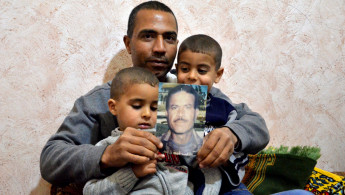A testimony to Palestine's 1987 day of rage
Mohammad Abu Zaid sits with his family in his newly rebuilt home in Gaza's Maghazi refugee camp. Pained, he speaks about a day 26 years ago, which he has never been able to forget.
On 8 December, 1987, Mohammad's father Taleb Abu Zaid was travelling back to Gaza from work in Tel Aviv when an Israeli driver rammed his truck into their car, killing Taleb along with three other passengers.
Trigger for rebellion
His uncle, Jawad Abu Zaid, was injured in the crash and sits by his nephew's side. Mohammad speaks about how he felt when he first heard about his father's death and how Palestine erupted in rage. Many see the death of the four Palestinian men as the trigger for the First Intifada.
"I can remember very well what happened that day. As our family were told about the deaths, people in the area took to the streets," said Mohammad. "I ran to a gathering in the downtown area to hear people spread news about my father's death. It was an unforgettable moment that has personally shaped me."
Mohammad, his brother Ahmed, and sisters Suzan, Fatma and Shirin were left without a father, while his mother Um Mohammad grieved for her husband.
"Although I was only 12 years old, I had a double feeling of obligation towards my family and the intifada," Mohammed continued. "I started to engage in stone throwing-against the occupying Israeli army. I was arrested three times for throwing stones at soldiers, and finally I was summoned to stay in custody. I was held there from early morning until the afternoon for almost one year."
| Inside the intifada | |
| Don't miss The First Intifada from inside an Israeli prison - a personal account of the build-up to the uprising |
Four years later, when Mohammad was 16, he was detained in an Israeli prison in the Negev Desert for several months.
"The most difficult time for me was when my mother and my cousin visited me on the day of my trial at the Saraya Israeli military compound in Gaza City," he told al-Araby al-Jadeed.
"By then I had begun to have very bitter feelings because of the absence of my father, may he rest in peace. Another difficult moment was the day I was engaged because my father was not there to stand by my side."
Angry and active
When Mohammad was released from prison, like his father, he worked in construction, but now owns a satellite dish store in his home town with his younger brother, Ahmed.
"I don't think we need a third uprising right now. When my father died many people from our community were very warm and supportive. Now, many people get killed and life just goes on. I deplore the existence of so many political factions in Palestine and I deeply hope that these parties, mainly Hamas and Fatah, will reconcile soon and agree on a strategy for liberation," Mohammad said.
Usama Rayan, better known by his nom de guerre Abu Shafiq, was another Maghazi resident that was active during the intifada. He agreed with Mohammad's sentiments about a divided nation.
 |
|
| Kamal says the crash changed his life [Shadi al-Qarra] |
"I remember then that people were very well connected to each other, which made up a nice symphony of struggle against the Israeli occupation. But now I don't believe we need an uprising against Israel, but rather an uprising against our leaderships that has led us to this deadlock," he said.
Kamal Hamouda was riding in the front seat of the Peugeot that was hit by the Israeli truck driver. He survived but lost a family member in the crash.
"I was riding along with my cousin, Essam Hamouda, in the front seat when suddenly the truck driver turned his wheels into our car, taking the life of my cousin, and three others. My life has never been the same since then," he says.
| Many see the killings of the four Palestinian men as the trigger for the First Intifada. |
Returning home
Kamal, heavily bearded, spoke while conducting his duties as a guard at a local state primary school. He says that the injuries he sustained to his legs during the crash still affect him to this day.
"For one year after the incident, I remained unable to move, my two legs almost paralysed and I had to rely on a mobility walker," said Kamal. "I remember, when I was driving back to Gaza, I was so excited to return back home to see my newly born son, Bilal. The Israeli truck driver robbed me of any feeling of happiness."
Back at the family home, Mohammad's uncle Jawad recounts his version of events. Jawad remembers being in the car with his cousin and heading back to Gaza when he saw a truck heading in the opposite direction. It turned towards their direction and Jawad woke up in a hospital. For a year afterwards he underwent counselling to help him cope with the experience.
"Taleb and I used to work side-by-side on the outskirts of Tel Aviv. On that day, we were driving to work when we saw an accident on the main road in Ashdod when Taleb suggested that we miss work that day and head back to Gaza. Suddenly he changed his mind and we kept on going," he said.
"Our destinies were waiting for us."



